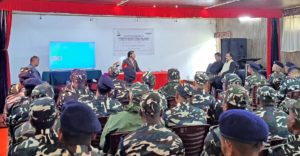Guwahati, Aug 26 : Based in the picturesque and pristine hilly landscapes of Dirang and Tawang in the frontier state of Arunachal Pradesh these Sashatra Seema Bal (SSB) personnel numbering around 130 would not have reasons to believe that the frontiers they are entrusted to guard over are being used by the global racket for illegal trade in wildlife unless they got the opportunity to attend the workhops organised by experts from Aaranyak on the burgeoning global wildlife crime.
The illegal trade in wildlife is now the 4th largest across the world after the illegal trade in drug, arms smuggling and human trafficking. It has posed grave threat to the wildlife in the frontier region of Northeast India which is rich in biodiversity.
In view of this harsh reality in wildlife crime scenario where one of the country’s bigger neighbour is considered a major consumer on wildlife, research-based premier biodiversity conservation organisation, Aaranyak (www.aaranyak.org) with support from the US Fish and Wildlife Service (USFWS) conducted two sensitiation workshops on wildlife crime for SSB personnel based in Dirang ( 30th Battalion) and Tawang (38th Battalion) in Arunachal Pradesh.

The Aaranyak’s team of resource persons led by Dr Bibhab Kumar Talukdar, the CEO and a globally acclaimed wildlife conservation scientist and wildlife crime monitor, interacted with 128 SSB personnel from 30th, 38th and 37th (Lumla) battalions in the two workshops held on Wednesday and Thursday.
The Aaranyak team enlightened the SSB personnel about the dire need to protect precious wildlife from the hawkish global wildlife crime/trade racket and the important role the SSB can play in the effort. The SSB personnel were also enlightened how this wildlife trade racket is a grave threat to the national security because of its intricate link with global armed smugglers and insurgents of the region.
Both workshops were graced by the Commandants of the respective SSB battalions — Upendra Kumar (Dirang) and Ganga Singh Udawat (Tawang).
Setting the tone of the workshop at Dirang, Commandant Upendra Kumar said,” The Indian Constitution grants equal rights to human beings and animals- both deserve to live without torture. As Indians, we need to uphold ‘ahimsa’ and threat posed to all animals and plants should be fought against at the border, local, national or international level is essential. Otherwise we cannot retain our treasures.”
In the workshop at Tawang, Commandant Ganga Singh Udawat addressing the SSB personnel said, “We are the pillars of the society. As SSB cadres, we are the upholders of the law. All our heart and soul must go towards speaking for the voiceless. Wildlife cannot speak about the injustices done to them. It is us, who needs to make sure they are protected and they get justice.”
Addressing the workshops, Dr Bibhab Kumar Talukdar highlighted the global perspectives of wildlife crime with respect to the Indian Subcontinent and how the wildlife in the biodiverse Northeast region is in peril.
He sensitised the SSB personnel on Aaranyak’s sustained efforts towards research and policyreform to protect the wildlife in the region. He pointed how Aaranyak acts as a catalyst with different stakeholders ranging from police to judiciary to general public, to spread awareness against wildlife crime.
The senior manager of Legal and Advocacy Division (LAD) of Aaranyak Dr Jimmy Borah addressing the workshop made presentations on how wildlife crime affects the society and why it needs to be prioritised. “Civil unrest, proliferation of zoonotic diseases, loss of livelihood, drug smuggling, arms trade is closely linked to illegal wildlife trade,” he said and flagged on how border guarding forces are of utmost importance in curbing illegal wildlife trade.
Aaranyak official Ivy Farheen Hussain in her presentation highlighted some case studies of Arunachal Pradesh in the recent years and discussed the way wildlife criminals operated locally. She also talked about the wildlife species most vulnerable to wildlife crime in the region and the reasons for it.



